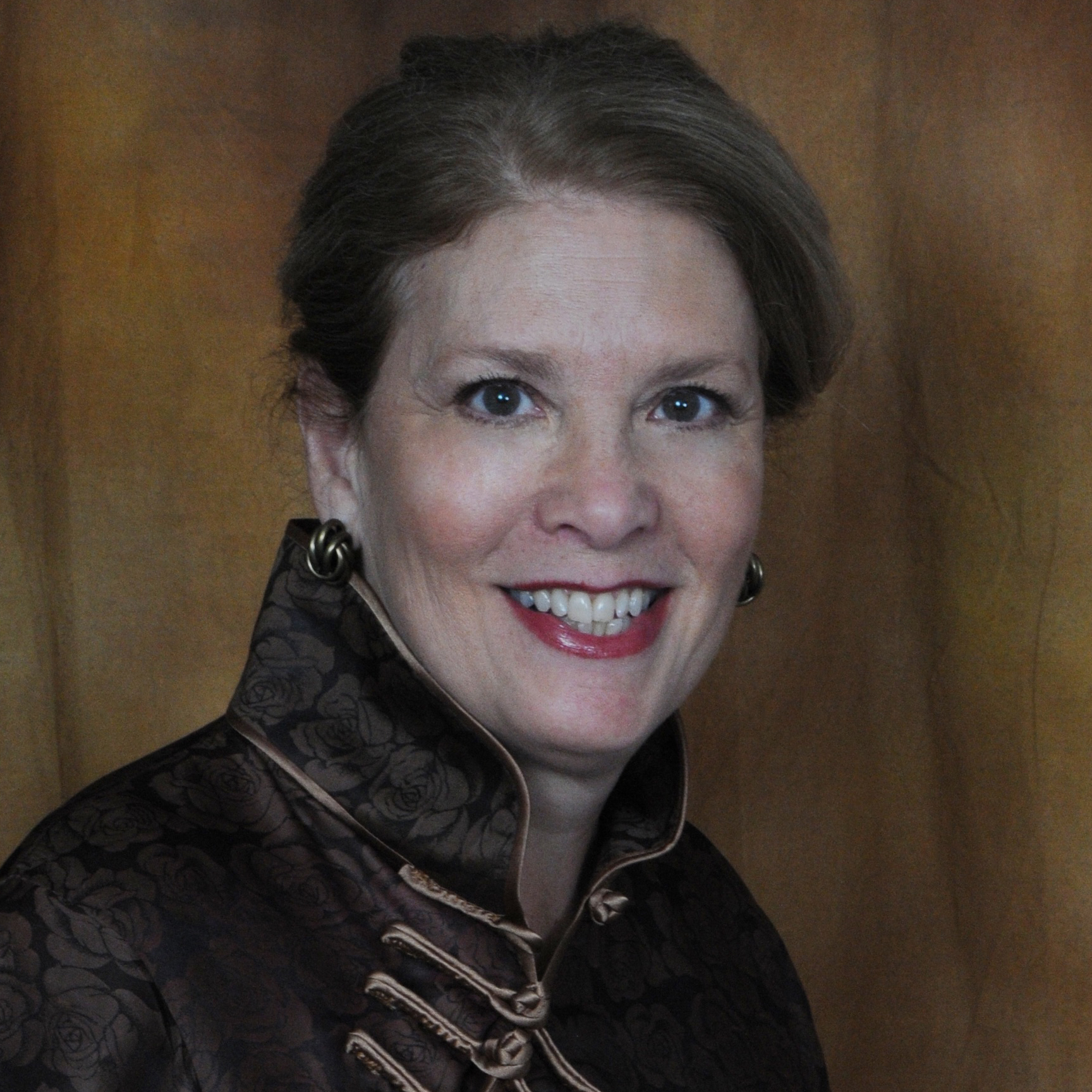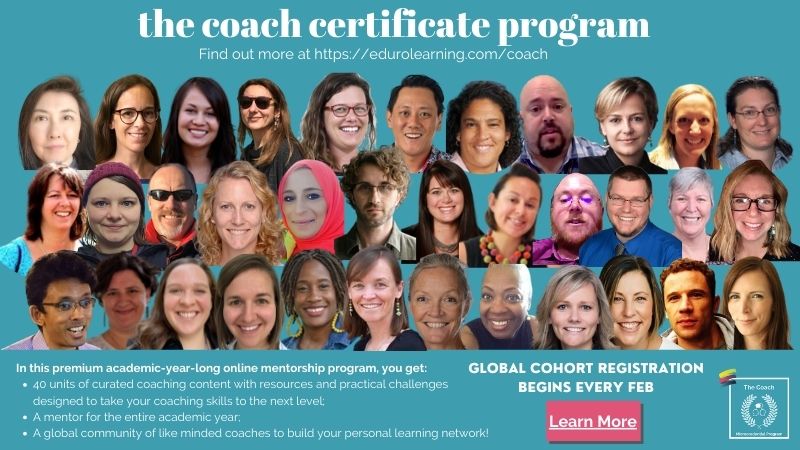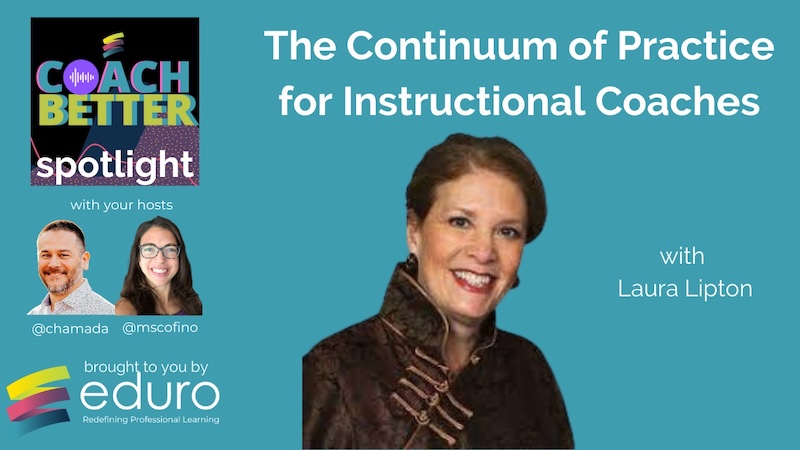In this #coachbetter episode, Kim talks with Laura Lipton about many of the aspects of Laura (and Bruce Wellman’s) work that we use inside The Coach, including the Continuum of Practice within coaching, using data to measure our impact as coaches, the art of coaching, and working with school leaders to help them understand the value of coaching. Laura is an established expert in all of these areas, and getting to hear her share so many foundational elements of successful coaching is powerful.
This conversation will give you a lot of insight into The Coach Certificate and Mentorship Program because there are so many aspects of Laura’s work that we use within the program. Wherever you are in building a coaching culture in your school, The Coach will give you the strategies, skills, and tools you need to make coaching a success. This academic-year-long online course & mentorship program will empower you to confidently apply instructional coaching strategies in any situation – from building a coaching program to being a leader in your school community. Registration for our next global cohort opens on the 21st of February and closes on the 14th of March. Find out more, and join the waiting list at edurolearning.com/coach today!
Subscribe to #coachbetter via your favorite Podcast Player!
Featured Guest

Bonus! Watch the Spotlight Version on YouTube!
Show Notes
Please tell us a little bit about how your work has evolved over time – this could be focused on your personal journey and also your books and the way your thinking about coaching has evolved.
Started in the classroom, teaching was always integrated and teaching-centered, how you can engage kids. The gift of education is how to be self-reliant, how to be a problem solver, how to be a good thinker. Same skills transfer to adults when I worked as an admin. Influence was one step away, and then broader. Introduced to Cognitive Coaching. Not talking about being corrective, changing behavior, talking about influencing the way people think, and changing behavior that way.
Eventually left school life and built a publishing firm
One of my favorite resources to share with coaches is your book, Mentoring Matters. One of the “aha” moments that often comes out of that resource is the challenge of getting “stuck” in one role. How do you help coaches (and teachers) recognize the needs of their coachee & how to choose and use the right role for this moment?
The Continuum of Practice. Based on the balance of information with the processing of that information. Who is providing the information in the moment is where we identify the stance.
Fall in the trap of expertise. Be wary of “what should I do?”
In any stance, a coach is a growth agent. Has one goal: to increase capacity and decrease dependence. If you embrace that goal, giving advice falls in the face of that.
What did you do to increase capacity? Offer some information and critical learning pieces and then inquire about that information. Here are a few pieces of information that might be relevant given your goal, as you think about that what might you want to implement.
We want the learners to own their learning
HABIT CYCLE Charles Dewy: cue, routine, reward – have to break that cycle – between cue and routine, create awareness, and then build a pattern break. Instead of solving, pattern break and asking a question, a new reward is a deposit in the capacity bank.
Colleagues WANT you to be consulting. In order to create commitment and ownership, it’s a dance. Don’t discount the value of the information of the consultant, because it is a resource.
Offer chunks of information with the opportunity to process
At any juncture of interaction, there’s a range of possibilities. Consider what are my options and what my best suit the moment. Operating in the moment & also over time.
How can I break the pattern if someone is always coming to me with consulting
Another big question that comes up all the time with our coaches is: how do we collect and analyze data, not only on student learning but also on the impact of our coaching? I’m thinking about two of your books here (Data Driven Dialogue & Got Data?), what are some concrete ways that coaches can become more comfortable with both collecting and analyzing data with teachers and for themselves?
The purpose of data is to continuously improve. One of the issues is that data is used to “prove” not “improve” and people can get uncomfortable with that. So, starts with the purpose of data – having a conversation about that to reduce the threat, so we can build habits of self-assessment.
Inquire with the coachee about what data they would be most interested in, for later review. Might be for both of you together, or just to hand over to the teacher. Mutually decide what data would give you the information you want to know, how do you want to get the data, and then it’s yours, I’d love to talk with you about it.
Video is incredibly powerful, and give the video to the teacher before you’ve even seen it.
Agreement on purpose, with a shared analysis and teachers taking the lead and teachers having choice.
Data becomes the opportunity to identify any gaps (above or aspiring to the standard). Data needs to be connected to the standard. Always standards-driven. Could be student-developed rubric. Excellence is defined, in increments and data supports determining where on the journey
Real power in studying success. Look for what really worked. Taking what worked The key piece in data-supported reflection, in order to apply them (future-oriented). Have to talk about cause-effect. If you not talking about causal factors you’re wasting time
What’s YOUR level of coaching mastery?
All coaches go through various stages of coaching mastery. Once you identify where you’re at, you can begin to build the skills needed to move to the next stage.
This quiz is based on real-life case studies compiled from years of working with coaches inside The Coach Certificate & Mentorship Program!
When you receive your results, you’ll also get your matching case study from the STRIVE Case Studies to see where you fit in the stages of coaching mastery.
Ready to tackle your challenges and move on to the next level in YOUR coaching practice?

The STRIVE Model of Coaching Mastery quiz will help you identify your level of coaching mastery by matching you with case studies compiled from years of working with coaches inside The Coach Certificate & Mentorship Program so you can easily see where you fit!
When you complete the quiz, you’ll get:
- Your matching case study,
- Specific strengths & challenges aligned to your result;
- Suggested next steps for each stage;
Plus the Case Study Document includes:
- Case studies leveled by coaching mastery;
- A framework to identify essential stages of professional growth & key areas to focus on in your professional learning;
- Alignment with the THRIVE Model for a Successful Coaching Culture;
- Space for you to reflect & prioritize so you can take action immediately!
You’ll go straight to the Quiz, and get the Case Study Document via email
Show Notes continued…
In your work with teams and schools all around the world, what makes coaching work well? What are ways that we, as coaches, can work effectively with individuals, teams and larger groups (like a division or whole school)?
Separate the act of coaching with the coaching program: good allotment of time, modeled respectfully whenever you hear it referenced, clear expectations that are modeled whenever you reference, standards with some way to measure that the program is getting us what we want, coaches have an opportunity to network so there’s continuous improvement, scheduling.
The act of coaching: what makes it work:
Identity: the coach’s identity as a growth agent. Leadership is often referred to as a change agent, but change has a remedial context. Growth is more developmental, let’s see where you can aspire to. There are always ways to get better and better. Developmental mindset. Embrace that. (language). Sometimes coaches go in with the mindset to fix so they’re looking for problems in practice. I’m looking to support and stretch, not to correct.
Listen: be more curious than judgemental. Judith Warren Little Collaborative Teams: “listen with the most generous interpretation” (if I can’t ask what’s making you do that, embrace positive presuppositions)
Learning focused
Cultivate these habits
Use of paraphrase, not parrot phrase. Offer what you’re understanding and then get a confirmation or correction & that gets you much further. It’s a normal relational gift. The message that I’m authentically sending is that I understand what you’re saying or I really want to understand what you’re saying, which means I care about you
How do you help school leaders understand the value and purpose of coaching? Many of our listeners are in coaching positions with admin who may not have a clear vision of the role. How can they better build that understanding among school leadership?
From a building level (ideally an organization level) there needs to be a vision of learning & growth, that is identical for everyone in that organization. So whenever someone is called upon to serve in their role, it should be calibrated to the vision of learning & growth.
So often, we fix what’s showing, not what’s broken.
The way the individual functions is congruent with the vision of growth and learning.
How are these tasks fulfilling the greater goal of supporting student learning. Have the conversation about expectations, here are some of mine
Support the coaches in how to have that conversation: rehearse it
Same conversation with the people they’re coaching
To what degree does this align with the greater vision?
Please tell us about your most recent book! Where did the idea come from and how is it shaping (shaped by) your current work?
COVID has been surprising in my professional trajectory. Demand for virtual PD. How can I create learning sessions that are highly engaging? Zoogling: integration of Google & Zoom. How do you take the Zoom big 6 tools of breakouts, annotation, renaming, whiteboards, & maximize professional learning? Tech gives you access to things you couldn’t do otherwise.
Starting to publish books by other people
Level Up Your Coaching with The Coach!
If you are ready to develop your coaching practice over the next academic year, and explore topics like transitioning your work from individuals to teams, please join us for our next cohort of The Coach!
Wherever you are in building a coaching culture in your school, The Coach will give you the strategies, skills and tools you need to make coaching a success and will empower you to confidently apply instructional coaching strategies in any situation – from building a coaching program, to having coaching conversations, to being a leader in your school community. We facilitate only one cohort each academic year so we can offer individualized support for each participant.
Registration for our next global cohort opens once a year – check the website for details!

Find out more at: https://edurolearning.com/coach/





Recent Comments